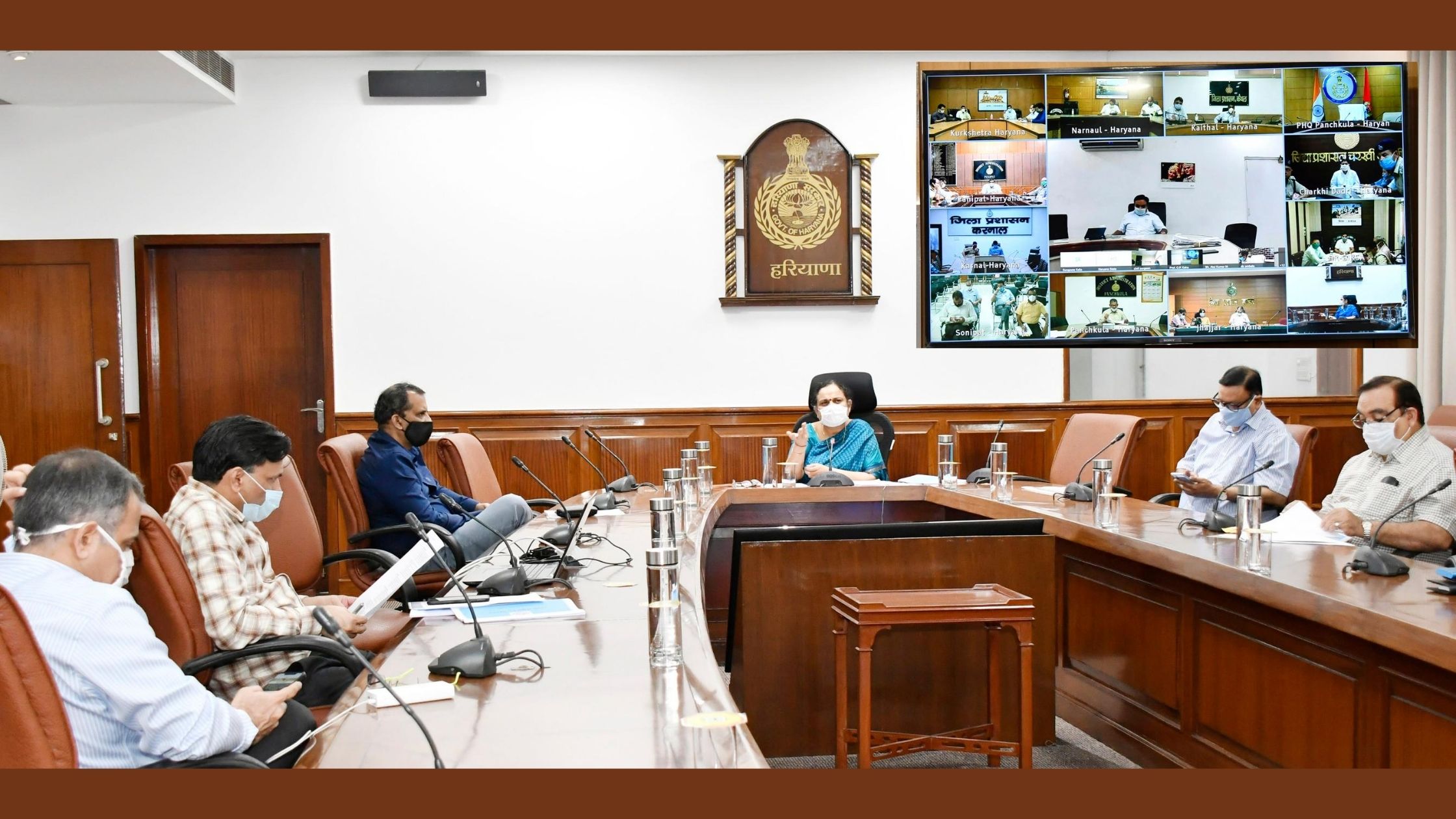Chandigarh, September 3– In view of the upcoming paddy harvesting season, Haryana, Chief Secretary Mrs. Keshni Anand Arora has directed the officers concerned to focus on ensuring zero-stubble burning in the state.
These directions were given by the Chief Secretary in a meeting held in compliance with the orders of the Apex Court, with Stakeholders regarding Crop Residue Management in which Deputy Commissioners of all districts, Vice-Chancellor of Haryana Agricultural University, Member Secretary of Haryana Pollution Control Board, Director of HARSAC, Executive Director of IOCL, Representatives of NABARD, MD of AAFC India, All India Agricultural Implements Manufacturers Association, Ludhiana Representative, Haryana Agricultural Implements Manufacturers Association, Hisar were present through video conferencing. The Chief Secretary discussed the problems being faced by the Stakeholders in Crop Residue Management and sought suggestions for it.
The Chief Secretary acknowledged the good work done in Crop Residue Management last year in the state. She was apprised in the meeting that according to HARSAC’s satellite pictures and reports, there was a decline of 68 percent in fire incidence of crop residues last year in comparison to previous years. Mrs. Arora instructed all district officers to draw a comprehensive plan in order to work towards zero-stubble burning in the state effectively. Other than this, she asked the officers concerned to identify the villages falling under red and yellow zones, which do not have Customer Hiring Centres (CHCs) and are yet to apply for them. She further asked them to ensure that these villages move applications for it at the earliest. She subsequently instructed the office bearers of the Panchayats to ensure utilization of machinery provided at 851 Custom Hiring Centres (CHCs) set up at Panchayat-level to its full capacity while giving preference to small and marginal farmers. Besides this, storage of crop residue bales should be done on Panchayat Land. Moreover, to reduce the incidence of stubble burning directions were also given to hold Gram Sabha meetings.
She further instructed the officers of the Agriculture Department to focus on those Red Zone areas in the district which have regular incidents of stubble burning. She further instructed that surveillance teams should be constituted and nodal officers be appointed. She emphasized that efforts should be made at the village-level, to make the panchayats and farmers aware of stubble burning.
The Chief Secretary asked the stakeholders to prepare an online system for farmers taking equipment through Customer Hiring Centres (CHCs) so as to get information whether farmers are using the equipments or not.
She said that in view of the spread of corona virus it is imperative to ensure zero-stubble burning in the state because many types of respiratory diseases are likely to spread due to increase in pollution in the environment, which can further increase the chances of spreading coronavirus.
She further asserted that it is the responsibility of the state to prevent air pollution for which the villagers should be made aware and encouraged to play an instrumental role in preventing environmental pollution. Moreover, all departments along with Agriculture Department should cooperate in creating awareness among farmers, she added.
In the meeting, Additional Chief Secretary, Department of Agriculture and Farmers Welfare, Mr. Sanjeev Kaushal instructed the officers to prepare a calendar wise programme to make the farmers aware of Crop Residue Management. The state government has helped small and marginal farmers growing non-basmati rice and Muchal varieties of basmati rice by providing adequate machinery and Rs 1,000 per acre as operating cost.
He said that in order to conserve ground water in the state, ‘Mera Pani, Meri Virasat’ Scheme has been implemented in which the farmers of blocks where groundwater level is below 40 metres have been encouraged to grow crops with low-water consumption like maize, millet, cotton, pulses and horticultural crops under Crop Diversification Scheme during Kharif-2020. Under this scheme, the state government has promised to give Rs 7,000 per acre, with Rs 2,000 as the first installment after verification of the crop and the remaining Rs 5,000 at the time of harvesting the crop. For this, 40,960 hectare area of the state has been verified so far. It has been assured that 100% procurement will be done from these areas at the Minimum Support Price (MSP). In addition, a Bhavantar Bharpai Yojana is being run for the purchase of vegetables. Online applications have been invited for subsidies on nine types agricultural equipments used for Crop Residue Management in the district under Crop Residue Management (CRM) Scheme. A target has been set to provide 820 Customer Hiring Centres (CHCs) and 2,741 personal equipments for the year 2020-21. Divulging more details he said that the state has decided to reserve 70% of the total allocation for Small and Marginal farmers for providing agriculture implements under individual category and CHCs.
It was apprised in the meeting that large-scale awareness campaigns have been conducted by using IEC (information, education and communication) activities such as village and block-level camps and celebrations, social media awareness and demonstration vans. Farmers have been trained to operate and maintain in-situ crop residue management machinery and a demonstration of in-situ management techniques has been given in their fields. Hoardings and banners have also been installed at key places by the Agriculture Department to spread awareness about in-situ crop residue management.
It was informed in the meeting that about 8 lakh metric tonnes of crop residue management is being done annually through ex-situ crop residue management in the state. Permission has been granted to 4 biomass power projects for biomass crop residue management in the state. So far 66 letters of compressed bio gas have been issued to oil companies in the state. With the setting up of these plants, crop residue management of 22 lakh metric tonnes per year will be possible.
In the meeting, Additional Principal Secretary to Chief Minister and Chief Executive Officer of Haryana Kisan Kalyan Pradhikaran, Mr. V Umashankar, Principal Secretary, Development and Panchayat Department Mr. Sudhir Rajpal were also present through video conferencing.

 हिंदी
हिंदी






